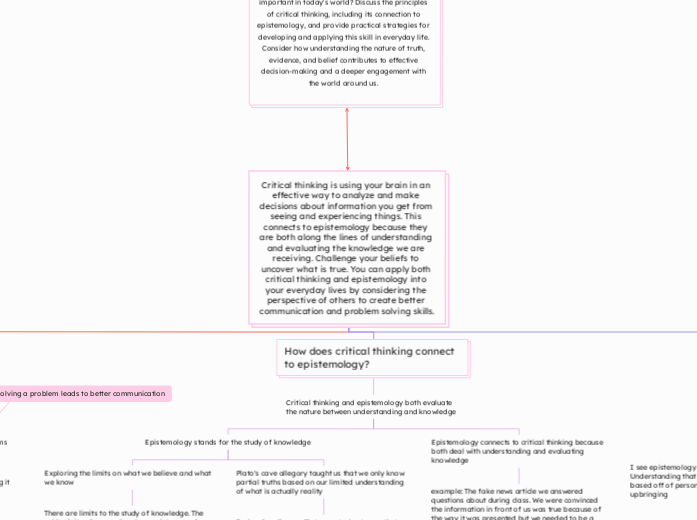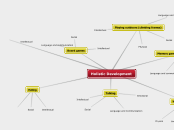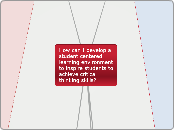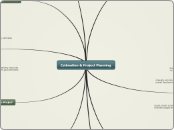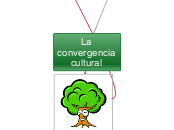Prompt: What is critical thinking and why is it important in today's world? Discuss the principles of critical thinking, including its connection to epistemology, and provide practical strategies for developing and applying this skill in everyday life. Consider how understanding the nature of truth, evidence, and belief contributes to effective decision-making and a deeper engagement with the world around us.
Critical thinking is using your brain in an effective way to analyze and make decisions about information you get from seeing and experiencing things. This connects to epistemology because they are both along the lines of understanding and evaluating the knowledge we are receiving. Challenge your beliefs to uncover what is true. You can apply both critical thinking and epistemology into your everyday lives by considering the perspective of others to create better communication and problem solving skills.
Explain strategies you can use for applying critical thinking and epistemology to your life.
Useful strategies for applying critical thinking and epistemology to your life include
Personal examples
cognitive biases?
we are biases to keep the same opinion even when we are hit with new information
there is a fine line between evidence we ignore and our personal beliefs and we tend to only look for new information that supports our own opinions
The anchor bias is a great example of this, we are so drawn to the first piece of information that we here that it becomes hard to change our minds when new information is entered
We avoid new information that might challenge our previous beliefs and what we think we know
fallacies?
The straw man fallacy is creating a weak summary of the other persons view in order to discredit it
an example of this would be distorting your competitors argument to make it seem more extreme and less valuable than your own
Ad Hominem is a fallacy that discredits someone based on their character, not their argument
an example of this is basing someones argument off of something as silly as the grades they got in high school, you then feel you can't trust a persons opinion if you believe it is based off of their character
Strategies for applying CT
"In ou daly lives, we face many situations where we need to think critically to make decisions and solve problems effectively. Critics thinking helps us navigate through these scenarios with clarity and rationality" (45)
Limit your egocentrism: explore other perspectives and try to understand why others might have the beliefs they do even if they are different from what you personally believe
Change your perspective to be able to see the side of others beliefs
Overcome the barriers of personal biases by limiting your assumptions and being aware of possible misundertsandings
I see epistemology in my life everyday. Understanding that my personal beliefs which are based off of personal experiences and my upbringing
Understanding we don't know everything and there is much information to be learned about
How we perceive things shapes our minds into thinking a certain way. Our beliefs and values impact our realities (from notes)
This relates to my life because my experiences shape who I am and how I approach challenges in my everyday life.
How does critical thinking connect to epistemology?
Critical thinking and epistemology both evaluate the nature between understanding and knowledge
Epistemology connects to critical thinking because both deal with understanding and evaluating knowledge
example: The fake news article we answered questions about during class. We were convinced the information in front of us was true because of the way it was presented but we needed to be a little more skeptical because not all information we see is true.
This relates to epistemology because we need to understand how to tell the difference between facts and what we believe
Epistemology stands for the study of knowledge
Plato's cave allegory taught us that we only know partial truths based on our limited understanding of what is actually reality
During the allegory Plato was trying to say that we are seeing things with our eyes and
assuming that is the reality of what we are seeing. when in reality we are seeing different
forms of things. We are trapped in ignorance and the journey out of the cave represents
the journey to knowledge. (from assignment)
This relates to epistemology because our knowledge is seemingly based on what we believe is the truth in situations when in reality having an open mind will take us further in relationships
Exploring the limits on what we believe and what we know
There are limits to the study of knowledge. The subjectivity of perception, incompleteness of information, and the uncertainty of the foundation that the information comes from
What is critical thinking and why is it important?
Critical thinking is important tool for navigation through life
critical thinking is essential for solving problems efficiently
"when addressing a problem, begin by defining it clearly and ensuring everyone understands its context." (51)
Ensuring everyone is on the same page and can contribute effectively to finding a solution
"By destructing the issue into smaller components, you gain clarity on its nature, scope, and causes." (61)
breaking down complex problems leads to more precise decision making and will help get you to the right outcome
Critical thinking is an effective way to communicate better
"Good communication skills help explain ideas, foster lasting connections, and reduce misunderstandings." (20)
When you are implementing critical thinking you are actively listening to others, giving feedback, and understanding the message they are trying to portray
"communication is crucial for success in life" (18)
communication is essential for building relationships and solving problems.
"critical thinking is "thinking about how to think" (8)
We can make more informed decisions but closely evaluating situations
"using your brain in a smart way to understand, use, analyze, and make decisions about the information you get from seeing things, experiencing stuff, thinking, or talking with others." (8)
This is helpful in our every day lives because it leads to logical solutions and having a more open minded view on life
